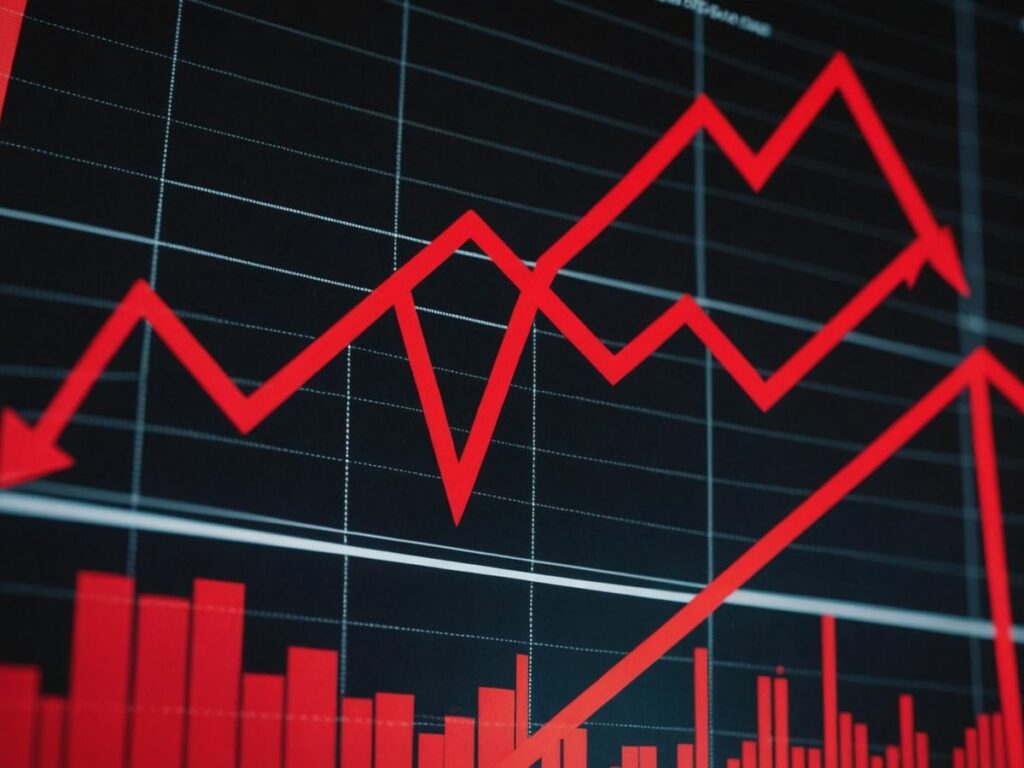Global stock markets experienced a significant downturn as fears of an impending recession gripped investors. Weak economic data, particularly from the U.S., coupled with disappointing corporate earnings, fueled the sell-off, leading to substantial losses across major indices. The tech-heavy Nasdaq, in particular, entered correction territory, exacerbating concerns about the economic outlook.
Key Takeaways
- Major indices, including the Dow Jones, S&P 500, and Nasdaq, saw significant declines.
- Weak U.S. jobs data heightened recession fears.
- Disappointing earnings reports from major tech companies like Amazon and Intel contributed to the sell-off.
- The Federal Reserve’s potential rate cuts are now under scrutiny.
Market Performance
The Dow Jones Industrial Average fell by 1.51%, the S&P 500 dropped by 1.84%, and the Nasdaq Composite declined by 2.43%. The Russell 2000 index of smaller stocks also slumped by 3.52%, marking its biggest two-day drop since June 2022. The Philadelphia SE Semiconductor Index closed at a three-month low after its largest two-day slide since March 2020.
Economic Data and Recession Fears
The U.S. Labor Department reported that nonfarm payrolls increased by only 114,000 jobs in July, well below the expected 175,000. The unemployment rate rose to 4.3%, its highest level in nearly three years. This weak jobs data triggered the "Sahm Rule," a historically accurate recession indicator, further stoking fears of an economic downturn.
Corporate Earnings
Several major tech companies reported disappointing earnings, contributing to the market’s decline. Amazon’s stock fell by 9.9% after reporting weaker-than-expected revenue and a cautious profit forecast. Intel’s shares plunged by 26.5% following a significant earnings miss and a suspension of its dividend payment. Conversely, Apple managed to post better-than-expected results, with its stock rising by 0.9%.
Federal Reserve and Interest Rates
The Federal Reserve’s potential rate cuts are now under intense scrutiny. Traders are betting on a better-than-three-in-four chance that the Fed will cut its main interest rate by half a percentage point in September. However, some analysts believe that the Fed may have waited too long to act, potentially exacerbating the economic slowdown.
Global Impact
The sell-off was not confined to U.S. markets. Japan’s Nikkei 225 index tumbled nearly 6%, while European markets also saw significant declines. Chinese stocks fell as investors were disappointed with the government’s latest efforts to spur growth through piecemeal measures rather than broader stimulus.
Commodities and Safe Havens
Commodity prices also experienced volatility. U.S. crude oil futures fell by 4.7% to $73.52 a barrel, hitting a two-month low. Gold prices, however, surged to fresh record highs, topping $2,500 an ounce, as investors sought safe-haven assets amid the market turmoil.
Investor Sentiment and Market Volatility
The CBOE Volatility Index, often referred to as the market’s "fear gauge," shot up to its highest levels since March 2023. Despite the sharp sell-off, some market participants viewed the downturn as an opportunity to buy stocks at lower prices. However, caution remains the prevailing sentiment as investors await further economic data and corporate earnings reports.
Conclusion
The recent market turmoil underscores the fragility of the global economic recovery. With recession fears mounting and corporate earnings under pressure, investors are bracing for more volatility in the weeks ahead. The Federal Reserve’s actions in the coming months will be closely watched as markets navigate these uncertain times.
Sources
- Dow Jones Futures: Recession Fears Grip Stock Market; Nvidia AI Chip Delayed? | Investor’s Business Daily, Investor’s Business Daily.
- Stock market crash: ‘The Fed is seizing defeat from the jaws of victory’ | Fortune, Fortune.
- Stock markets plunge as weak US jobs fuel fears, BBC.
- Stocks drop, Nasdaq confirms correction as recession fears mount | Reuters, Reuters.
- Stock Market Today: Dow falls nearly 500 points as recession fears reemerge – MarketWatch, MarketWatch.

